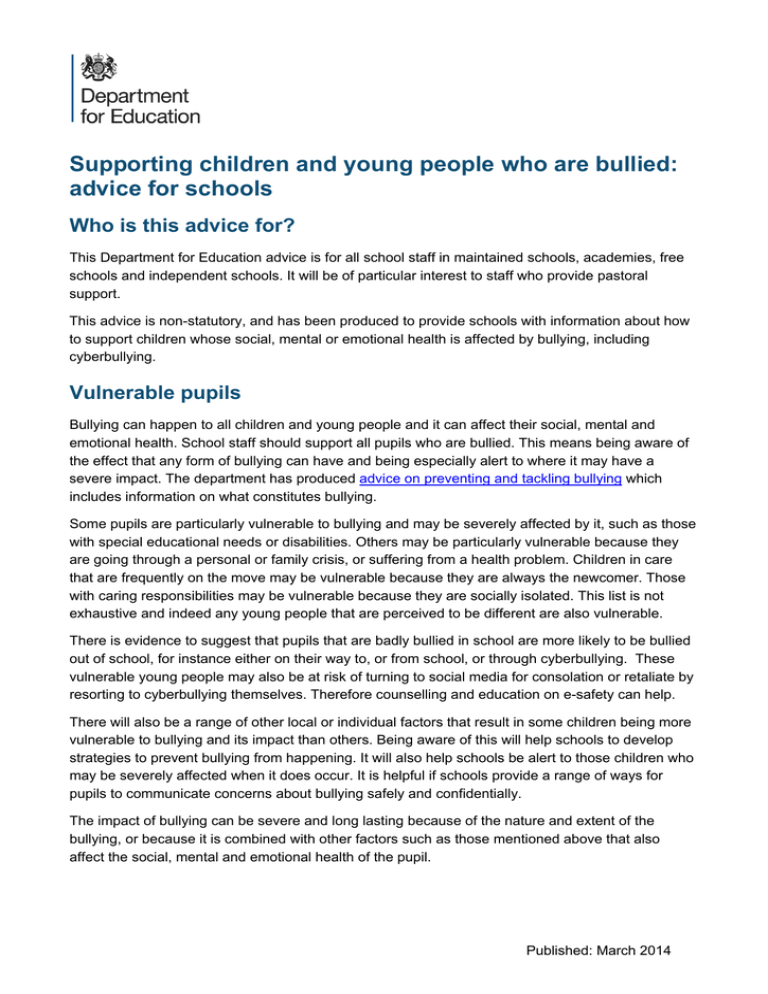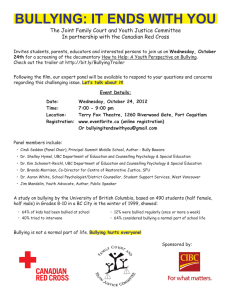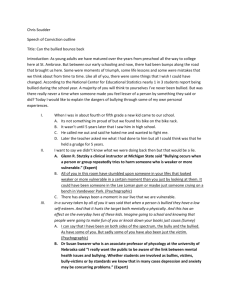Supporting children and young people who are bullied: advice for schools
advertisement

Supporting children and young people who are bullied: advice for schools Who is this advice for? This Department for Education advice is for all school staff in maintained schools, academies, free schools and independent schools. It will be of particular interest to staff who provide pastoral support. This advice is non-statutory, and has been produced to provide schools with information about how to support children whose social, mental or emotional health is affected by bullying, including cyberbullying. Vulnerable pupils Bullying can happen to all children and young people and it can affect their social, mental and emotional health. School staff should support all pupils who are bullied. This means being aware of the effect that any form of bullying can have and being especially alert to where it may have a severe impact. The department has produced advice on preventing and tackling bullying which includes information on what constitutes bullying. Some pupils are particularly vulnerable to bullying and may be severely affected by it, such as those with special educational needs or disabilities. Others may be particularly vulnerable because they are going through a personal or family crisis, or suffering from a health problem. Children in care that are frequently on the move may be vulnerable because they are always the newcomer. Those with caring responsibilities may be vulnerable because they are socially isolated. This list is not exhaustive and indeed any young people that are perceived to be different are also vulnerable. There is evidence to suggest that pupils that are badly bullied in school are more likely to be bullied out of school, for instance either on their way to, or from school, or through cyberbullying. These vulnerable young people may also be at risk of turning to social media for consolation or retaliate by resorting to cyberbullying themselves. Therefore counselling and education on e-safety can help. There will also be a range of other local or individual factors that result in some children being more vulnerable to bullying and its impact than others. Being aware of this will help schools to develop strategies to prevent bullying from happening. It will also help schools be alert to those children who may be severely affected when it does occur. It is helpful if schools provide a range of ways for pupils to communicate concerns about bullying safely and confidentially. The impact of bullying can be severe and long lasting because of the nature and extent of the bullying, or because it is combined with other factors such as those mentioned above that also affect the social, mental and emotional health of the pupil. Published: March 2014 Addressing the needs of pupils who are bullied The nature and level of support will depend on the individual circumstances and the level of need. These can include a quiet word from a teacher that knows the pupil well, asking the pastoral team to provide support, providing formal counselling, engaging with parents, referring to local authority children’s services, completing a Common Assessment Framework or referring to Child and Adolescent Mental Health Services (CAMHS). Where bullying has a severe impact In some circumstances the consequences of bullying may lead to a child or young person experiencing pronounced social, mental or emotional health difficulties. Schools should ensure they make appropriate provision for a child’s short term needs, including setting out what actions they are taking when bullying has had a serious impact on a child’s ability to learn. It is also important to try and build a co-operative partnership with parents. If the bullying leads to persistent, long-lasting difficulties that cause the child or young person to have significantly greater difficulty in learning than the majority of those of the same age, then schools should consider whether the child will benefit from being assessed for SEN. In July 2012 the cross-government No Health Without Mental Health: Implementation Framework was published. It describes the role that both schools and local authorities should play in supporting children and young people’s mental health and wellbeing. Special Educational Needs (SEN) Code of Practice While bullied children will not be routinely considered as requiring SEN support, schools and local authorities should provide support in a proportionate and tailored way to meet individual needs. The new draft SEN code of practice considers that developing a graduated response to the varying levels of SEN among children and young people is the best way to offer support, and this can include the needs of bullied children. Separate on-site provision Schools should do all they can to ensure bullied children continue to attend school. In addition to the examples of support listed above, this could include using separate on-site provision that provides respite for bullied pupils, whilst maintaining their educational progression. It is important that this support goes hand-in-hand with measures to tackle the bullying so that bullied children feel safe at school, and on their way to and from school. Removing bullied children from school, even for a short time, disrupts their education and can make it difficult for them to reintegrate. It also fails to address the causes of the problem and can send the wrong message that victims of bullying are unwelcome. Schools should respond sensitively where an absence arises as a result of bullying but, in most cases, it may not be necessary or helpful to remove a bullied child from school. 2 Alternative provision In extreme cases, where the effects of bullying are so severe that it is not possible to reintegrate a child back into their school, then other arrangements must be made for the pupil to continue their education. In the first instance this may involve the transfer of the child to another mainstream school. Where a child has developed complex needs as a result of bullying, which cannot be met in mainstream education, then alternative provision may need to be arranged. Local authorities must make arrangements for children of compulsory school age who, for any reason, would not otherwise receive suitable education. Suitable education is defined as efficient education suitable to a child’s age, ability and aptitude and to any special educational needs the child may have. This education must be full-time, unless this would not be in a child’s best interests because of health needs. In these circumstances the education should be as close to full-time as the child’s needs allow and kept under review. Separate statutory guidance on the use of alternative provision (January 2013) sets out that parents, pupils and other professionals should be involved in decisions about the use of alternative provision. It also states that there should be clear objectives and arrangements for monitoring progress. Alternative provision should have a rigorous focus on supporting children to continue their education whilst meeting their individual needs, including social, emotional and health needs. In the majority of cases the aim of alternative provision should be to support reintegration back into mainstream education, working closely with pupils and their parents to agree a plan and timetable for return. Useful resources for school staff MindEd is a free online training tool for adults that will be available to schools from Spring 2014. It can be used to help school staff learn more about children and adolescent’s mental health problems. It will provide simple, clear guidance on mental health and include information on identifying, understanding and supporting children who are bullied. The following organisations provide support for schools and parents dealing with specific bullying issues and the social, mental or emotional affects caused by bullying. Childline NSPCC Young Minds Family Lives Kidscape BeatBullying The Diana Award The Anti-Bullying Alliance © Crown copyright 2014 Reference: DFE-00094-2014 3






